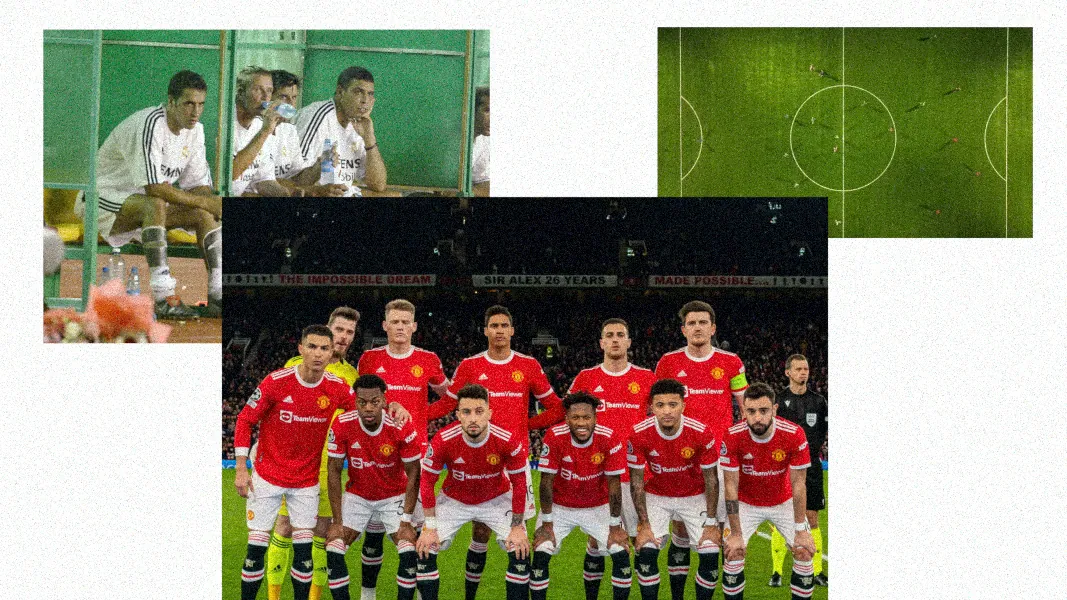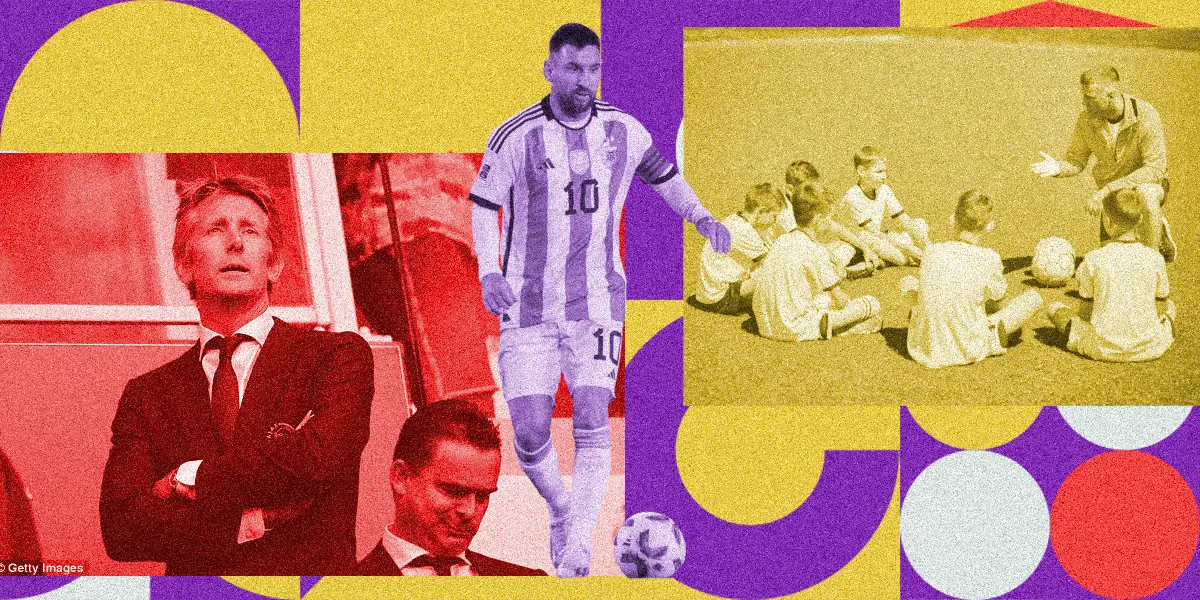The stark choice between “football” and “soccer” has ignited debates and reflections on linguistic preferences across nations. But despite the term’s unpopularity, you’ll be surprised by how many countries call football “soccer.”
The countries include:
- United States
- Canada
- Australia (alongside “football”)
- Japan
- South Korea
- New Zealand
- Philippines
- South Africa (to some extent)
These countries primarily use “soccer” to distinguish it from other forms of football.
This article aims to unravel the origins, implications, and cultural underpinnings of this linguistic divergence.
Origins of Football and Soccer
Embed from Getty ImagesYe Ancient Game of Football, Teams from Oxford and Cambridge Universities played a different kind of football in an end of term soccer ‘rag’ at Cambridge today. Officially called ‘Foot the Ball’ the game employed three balls, and the players wore old time gear and top hats. The trophy for the winners was a barrel of beer.
The term “football” finds its genesis in diverse ball games played across ancient civilizations, where the objective was to maneuver a ball into a designated area. Variations of these games emerged in different cultures, shaping the foundations of modern football.
“Soccer”, on the other hand, emerged as an abbreviation of “association football”. This label differentiated the sport from other forms of football, such as rugby football. The term gained prominence in the 19th century and took root primarily in countries where alternative codes of football prevailed.
These early origins laid the groundwork for the linguistic nuances that continue to define the sport today.
Football vs. Soccer
| Country | What It Is Called | Notes |
|---|---|---|
| Afghanistan | فوټبال | translation of ‘football’ in Pashto, one of the two major languages in Afghanistan |
| Albania | futboll | |
| Algeria | كرة القدم (kurat alqadam) | football in Arabic |
| Andorra | futbol | |
| Angola | futebol | football in Portuguese |
| Anguilla | football | |
| Antigua and Barbuda | football | |
| Argentina | fútbol | |
| Armenia | ֆուտբոլ) | translation of ‘football’ in Armenian |
| Aruba | voetbal | |
| Australia | Soccer and Football | The national body is the Football Federation of Australia, but most of the population call it soccer, as there are other popular football codes, Australian Rules and Rugby. |
| Austria | Fußball | |
| Azerbaijan | futbol | |
| The Bahamas | football | |
| Bahrain | كرة القدم (kurat alqadam) | football in Arabic |
| Bangladesh | football | |
| Barbados | football | |
| Belarus | футбол (futbol) | translation of ‘football’ in Belarusian |
| Belgium | football | |
| Belize | football | |
| Bermuda | football | |
| Bolivia | fútbol | |
| Bosnia-Herzegovina | nogomet | the word is derived from “noga”, meaning “leg” |
| Brazil | futebol | |
| Bulgaria | футбол | Bulgarian for ‘football’ |
| Burkina Faso | football | |
| Cambodia | បាល់ទាត់ (balteat) | |
| Cameroon | football | |
| Canada | Soccer and Football | For most Canadians “football” is associated with Canadian or American football |
| Central African Republic | football | |
| Chad | football | |
| Chile | fútbol | |
| China | 足球 | the characters mean 足 = foot and 球 = ball |
| Colombia | fútbol | |
| Congo | football | |
| Congo DR | football | |
| Costa Rica | fútbol | |
| Cote d’Ivoire | football | |
| Croatia | nogomet | the word is derived from “noga”, meaning “leg” |
| Cuba | fútbol | |
| Cyprus | “mappa” (μάππα) | means “ball” in greek-cypriot |
| Czechia | fotbal | kopaná for “kick game” is also used |
| Demark | fodbold | |
| Dominica | football | |
| Dominican Republic | fútbol | |
| Ecuador | fútbol | |
| Egypt | كرة القدم (kurat alqadam) | football in Arabic |
| El Salvador | fútbol | |
| England | football | |
| Equatorial Guinea | fútbol | |
| Estonia | jalgpall | |
| Finland | jalkapallo | |
| France | football | |
| Georgia | ფეხბურთი (pekhburti) | from ფეხი (pekhi = foot) and ბურთი (burti = ball) |
| Germany | Fußball | |
| Greece | ποδόσφαιρο (podosphero) | from πόδι (podi) = “foot” and σφαίρα (sphera) = “sphere / ball” |
| Grenada | football | |
| Guatemala | fútbol | |
| Guinea | football | |
| Haiti | foutbòl | ‘football’ in Haitian Creole |
| Honduras | fútbol (footbal) | |
| Hong Kong | football | |
| Hungary | futball | the official term is labdarúgás, literally “ball-kicking”, but foci is used in the common language. |
| Iceland | fótbolti or knattspyrna | knattspyrna come from knatt = ball and spyrna = kicking |
| India | फ़ुटबॉल (futabol) | as spoken in Hindi language |
| Indonesia | Sepak bola | meaning kick-ball |
| Ireland | football or soccer | both football and soccer terms are used. In Ireland, football can refer to association football or Gaelic football. Soccer is becoming less common, but remains strong in areas where there is another “football”. |
| Israel | כדורגל (kaduregel) | joining the words “כדור” (kadur: ball) and “רגל” (regel: foot, leg) |
| Italy | calcio | calcio is from the word calciare, meaning to kick. |
| Jamaica | football | |
| Japan | sakkā (サッカー) or futtobōru (フットボール) | The term sakkā has become more common since the 2nd world war because of the American influence, despite Japan’s federation being called the JFA. The native Japanese word for football, shuukyuu (่นด็ ), which is literally foot(่นด) ball(็ ). |
| Jordan | كرة القدم (kurat alqadam) | football in Arabic |
| Kazakhstan | футбол (fwtbol) | |
| South Korea (Korea Republic) | chuggu (蹴球 축구) | meaning “kick-ball” |
| Kuwait | كرة القدم (kurat alqadam) | football in Arabic |
| Kyrgyzstan | Жаныбарлар (janıbarlar) | |
| Laos | ບານເຕະ (ban-te) | literally meaning “ball-kicking” |
| Latvia | futbols | in Latvian it is also called kājbumba |
| Lebanon | كرة القدم (kurat alqadam) | football in Arabic |
| Liberia | football and soccer | |
| Libya | كرة القدم (kurat alqadam) | football in Arabic |
| Liechtenstein | Fußball | |
| Lithuania | futbolą | |
| Luxembourg | futbolas | |
| Madagascar | baolina kitra | |
| Malaysia | phutball ഫുട്ബോൾ | also, “Bolasepak” meaning ball-kick is used. |
| Mali | football | |
| Malta | futbol | |
| Mexico | fútbol | |
| Monaco | football | |
| Mongolia | хөлбөмбөг (khölbömbög) | |
| Morocco | football | |
| Mozambique | futebol | |
| Myanmar | ball-pwe | a pwe is a rural all-night dance party |
| Namibia | futebol | |
| Nepal | फुटबल (Phutabala) | |
| Netherlands / Holland | voetbal | |
| New Caledonia | football | |
| New Zealand | soccer and football | there has been a recent shift in usage from soccer to football |
| Nicaragua | fútbol | |
| Niger | football | |
| Nigeria | football and soccer | |
| Northern Ireland | football | |
| North Macedonia | фудбал (fudbal) | |
| Norway | fotball | |
| Oman | كرة القدم (kurat alqadam) | football in Arabic |
| Pakistan | football and soccer | ਫੁੱਟਬਾਲ (Phutabāla) in Punjabi |
| Palestine | كرة القدم (kurat alqadam) | football in Arabic |
| Panama | fútbol | |
| Papua New Guinea | soka | |
| Paraguay | fútbol | |
| Peru | fútbol | |
| Philippines | soccer and football | Soccer is more common, a result of the American influence |
| Poland | futbol | the sport is also known as piłka nożna from piłka (ball) and noga (leg). |
| Portugal | futebol | |
| Puerto Rico | soccer or fútbol | |
| Qatar | كرة القدم (kurat alqadam) | football in Arabic |
| Romania | fotbal | |
| Russia | футбол – futbol | |
| Rwanda | football | |
| Samoa | soka or football | |
| San Marino | calcio | |
| Saudi Arabia | كرة القدم (kurat alqadam) | football in Arabic |
| Scotland | football | |
| Senegal | football | |
| Serbia | фудбал – fudbal | |
| Singapore | football and soccer | |
| Slovakia | futbal | |
| Slovenia | nogomet | the word is derived from “noga”, meaning “leg” |
| Somalia | kubadda cagta | |
| South Africa | soccer | sokker in Afrikaans |
| Spain | fútbol | |
| Sri Lanka | පා පන්ද | from the words foot and ball in Sinhala |
| St Lucia | football | |
| Sudan | maén bal | |
| Suriname | voetbal | |
| Sweden | fotboll | |
| Switzerland | football | |
| Syria | كرة القدم (kurat alqadam) | |
| Tajikistan | футбол – futbol | |
| Thailand | ฟุตบอล – fút-bol | |
| Trinidad & Tobago | football | |
| Tunisia | كرة القدم (kurat alqadam) | |
| Türkiye / Turkey | futbol | |
| Ukraine | футбол – futbol | |
| United Arab Emirates | كرة القدم (kurat alqadam) | |
| Uruguay | fútbol | |
| US Virgin Islands | soccer | |
| USA | soccer | The word football is used to refer to American football, the dominant football code |
| Uzbekistan | futbol | |
| Venezuela | fútbol | |
| Vietnam | “bóng đá” and “đá banh” | both terms literally mean “kicking ball” |
| Wales | pêl-droed | fooball in the Welsh language |
| Yemen | كرة القدم (kurat alqadam) |
Regions That Use the Term Football
Embed from Getty ImagesThe term “football” finds stronghold in regions where centuries of tradition and cultural significance intertwine with the sport. In Europe, countries such as the United Kingdom, Spain, Italy, and Germany embrace this terminology.
“Football” embodies tradition, national pride, and a sense of unity. The term “football” encapsulates a rich heritage that connects people across generations and social strata.
Regions That Use The Term Soccer
Embed from Getty ImagesIn specific regions, the term “soccer” takes precedence as the favored descriptor for the beautiful game. Countries like the United States and Canada have adopted this nomenclature, albeit distinct from the majority.
In North America, the prominence of American football and Canadian football has contributed to the preference for “soccer” to differentiate the sport from these gridiron counterparts. This choice eases communication and eliminates confusion, as each sport occupies a distinct niche.
Moreover, the term “soccer” aligns with linguistic norms in these regions, where sports often have specific labels (e.g., “football” for American football). The casual nature of the term also appeals to a broader audience.

Why Do The United States and Canada Call Football “Soccer”?
Embed from Getty ImagesWhen soccer gained traction in the late 19th and early 20th centuries, it faced a landscape already populated by various forms of football. American football and Canadian football had already established themselves as dominant codes, each with their own rules and fan bases.
To prevent confusion, “soccer” emerged as a distinctive term to delineate the sport from the prevailing football codes. This pragmatic approach aimed to provide clarity and avoid overlap in discussions, media coverage, and casual conversations.
Furthermore, the linguistic adaptation of “soccer” aligned with North American naming conventions for sports. Over time, “soccer” became the accepted term. It reflected not only a linguistic preference but also a practical solution to coexist with other well-established sports.
American Football vs. Soccer in USA

American football, characterized by its strategic gameplay and fervent following, occupies a prominent place in the region’s sports consciousness.
On the other hand, soccer’s presence has steadily grown, buoyed by its global appeal and accessibility. While it initially faced challenges as a newcomer, soccer’s inclusive nature and alignment with international competitions gradually garnered attention.
Both sports boast fervent followings, with American football capturing the attention of fans drawn to its elaborate tactics and traditional rivalry matchups. Meanwhile, soccer’s universal appeal transcends borders, attracting diverse communities and establishing itself as a sport that bridges cultural divides.
Why Do Australians Call Football “Soccer”?
In Australia, the term “football” encompasses Australian Rules Football (AFL), a distinct and cherished homegrown sport. This game, characterized by its oval field and high-flying marks, has deeply embedded itself within the Australian identity.
Embed from Getty ImagesConcurrently, “soccer” occupies a growing niche in the nation’s sports scene. The influx of multicultural influences, coupled with global exposure through international tournaments, has propelled soccer’s popularity. The term “soccer” is used to differentiate the sport from Australian Rules Football and Rugby League.
Influence of British Colonization on Spread of the Terms Football and Soccer
British colonial history played a pivotal role in exporting the terms “football” and “soccer” to diverse corners of the world. As the British Empire expanded its reach, it introduced these sports to its colonies, imprinting linguistic and cultural legacies.
In regions like India and parts of Africa, “football” took root due to British influence. The game’s structure and rules provided a common ground for British settlers and local populations.
Embed from Getty ImagesThe term “soccer,” derived from “association football,” gained traction in British colonies as well. This concise term distinguished the sport from rugby football and other variations.
The adoption of football terminology due to colonial heritage is evident in specific regions around the world:
- South Asia (India, Pakistan, Bangladesh): British colonial influence introduced the term football to these regions. Local communities embraced the sport, and the terminology endured as a lasting legacy.
- Africa (Nigeria, Ghana, Kenya): British colonial history brought football to the African continent. The sport’s popularity grew, and the terminology persisted even after independence, becoming an integral part of these nations’ sporting culture.
- Caribbean (Jamaica, Trinidad and Tobago, Barbados): Colonization introduced football to the Caribbean islands. The game found fertile ground, evolving into a beloved pastime. The terminology remains a testament to the historical ties with the British Empire.
- Oceania (Fiji, Papua New Guinea): British colonial presence introduced both “football” and “soccer.” These terms resonated with the local populations, reflecting the enduring impact of colonial heritage on sports language.
Countries Where Linguistic Differences Impact the Choice Between “Football” and “Soccer”
Linguistic differences significantly influence the choice between “football” and “soccer” in various countries worldwide:
- Canada: Despite sharing similarities with the United States, Canada tends to use “football” and “soccer” interchangeably. This is due to its bilingual English-French context.
- New Zealand: The term “football” prevails here, reflecting British linguistic heritage. However, “soccer” is also understood and used.
- South Africa: The nation’s linguistic diversity contributes to varying terminology. While “football” is often used, the use of “soccer” also emerges due to linguistic nuances.
- Ireland: Here, football can refer to association football or Gaelic football. Soccer is becoming less common, but remains strong in areas where there is another “football”.
- Singapore: Despite being a multicultural society, Singapore tends to use “soccer” due to its historical exposure to British English.
- Malaysia: Similar to Singapore, Malaysia favors “soccer” due to historical British influence, even though the country possesses a diverse linguistic landscape.
In certain regions, the influence of indigenous languages on sports terminology is also evident.
- Bosnia-Herzegovina and Croatia: These countries call football “nogomet.” The term “nogomet” is derived from “noga,” which means “leg.”
- Cyprus: In Cyprus, people often call the beautiful game “Mappa”. Mappa here means “ball” in greek-cypriot.
- Czechia: Czech people call it fotbal, but it’s also referred to as “kopaná”. Kopaná roughly translates to “kick game”.
- Greece: The Greek call soccer “Podosphero”, literally translating to Football. Podi means foot and sphera means ball or sphere.
- Iceland: There are two terms used for soccer in Iceland. Fótbolti and Knattspyrna. Knattspyrna come from knatt = ball and spyrna = kicking.
Terms Used in Global Events
- FIFA World Cup: The term “football” dominates as the official title, reflecting the sport’s global identity.
- Olympics: The Summer Olympics use the term “football” where the sport is part of the lineup.
Evolving Language and Modern Usage
Social media exerts a profound influence on terminology preferences among young audiences.
- Global Connectivity: Social media connects young people from diverse backgrounds, fostering exposure to both terms. Online discussions and exposure to international content lead to familiarity with multiple terminologies.
- Influencer Impact: Influential figures on social platforms shape trends. If popular figures use a specific term, it can sway terminology preference among their followers.
- Cultural Fluidity: Social media breaks down geographical barriers, making youths open to diverse cultural influences. As they engage with global communities, terminology nuances become part of their lexicon.
- Interactive Discussions: Platforms like Twitter allow direct engagement. Youth actively debate and adopt terminologies during discussions, which can drive preference shifts.
- Memes and Creativity: Memes and creative content on social media often employ specific terms, contributing to their normalization among younger audiences.
FAQs About Countries That Call Football Soccer
Yes, several countries, especially those with strong ties to British influence, call association football, “soccer”.
Yes, Japan predominantly uses the term “soccer” to refer to association football. The term sakkā has become more common since the 2nd world war because of the American influence.
Australia uses both “football” and “soccer” due to its sports culture. “Football” is prevalent, but “soccer” is also understood and used.
Italians call soccer “calcio,” which translates to “football.”
Greeks call soccer “podosfairo” or “podosphero”, which translates to “football.”
Americans use the term “soccer” to differentiate the sport from American football and to align with linguistic norms in their sports culture.
Europeans often refer to American football simply as “American football” to distinguish it from their own version of football.
Conclusion: What Countries Call Football Soccer?
In conclusion, there are several countries that call football “soccer”. In fact, contrary to popular belief US isn’t the only country that uses the term soccer for the sport.
The reason for calling it football or soccer vary from country to country. The duality in Australia, the impact of British colonialism, and the sway of social media all play a part in shaping what countries call football “soccer”.
I hope you’ve found this article insightful and fun. If you did, I invite you to share this article with fellow soccer enthusiasts and spread the knowledge.











